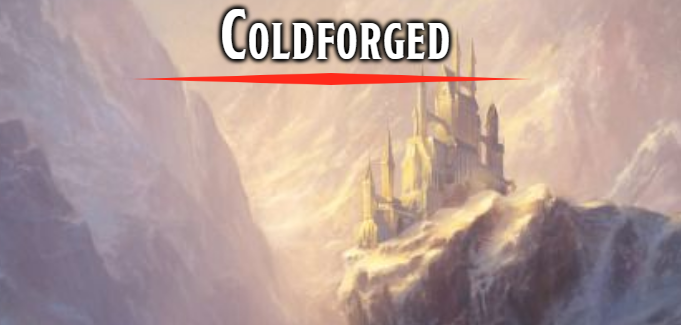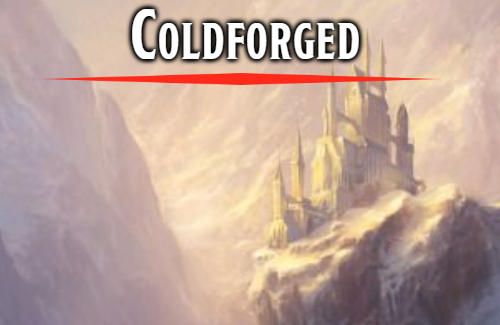
Coldforged: A Brief History of Tysis Part 2: The Kingdom of Levisha
Each Thursday this year, I focus on a different aspect of the world I’ve created and played D&D in for over 20 years, in the hopes of honing the ideas and cementing enough in place to settle the world in my own mind. This week I’m looking to start fleshing out the history of the continent. This week, we’re looking at the Kingdom of Lev
The Sundering
Prior to the Sundering, the northern portion of the current continent called Tysis was a great, wild forest, inhabited by the fey Kingdom of Hyran. The Elves were the clear majority and ruled over the other, minority fey, but the Kingdom was rent by the Demon Queens sundering. Ruins of this once great empire dot the north of Tysis, beyond the Ironarm Mountains and within the Frozen North. The Kingdom was nearly annihilated during the Sundering, and given no time to recover as the remnants were engulfed in continual winter. As the continent crawled across the surface of the world, drifting up towards the pole, the north became colder and colder. The elves, consulting the portents and seeing only frost, fled south. The Ironarm Mountains proved impassable to them, but the forest of Lev, much larger at the time, proved hospitable if teeming with fey creatures both familiar and new. The elves and the fey creatures, from gnomes, halflings, and centaurs to other more exotic creatures, agreed to live together. The elves insist this was a peaceful event, but a number of oral histories of the fey in the forest speak to great violence as the elves took the forest.
Combining their forces and heading south even beyond the forest, the Levishans headed toward even warmer and more fertile land, expecting the forest to eventually freeze over as well. This, however, is where they met trouble. In the southern forests, just west of Cragstone, they met their first Humans on the island. Allied with the Hrondirng and their neighboring dwarves, the Levishan envoys received less than stellar receptions. No one really knows what happened, but in the elves, they refer to it as the Last Insult, and there was war. The Elves and their allies marched to war against the Human and Dwarven realm, the Moresti.
Though the Elves and their allies won every battle, they were unable to capitalize on any of them due to the sheer fecundity of the humans and the durability of the dwarves. Finally, on the Hilean plain, the elves won their greatest victory. They routed two armies that had converged on their position, and though they were outnumbered and surrounded, the experience and discipline of the Levishans carried the day, but only barely. The Morestii suffered near complete losses, but the elven forces, too, had suffered from great attrition, leaving half of their number dead on the field of battles. Having lost so many of their youth, and trapped in a position where they were winning battles yet losing an unending war, the Levishans sued for peace. The Morestii accepted the peace of what the elves call the War of Gilded Blades and the Morestii simply called the Elf War. While there are only shreds of evidence left in human and dwarven memory, it is fresh in the minds of Elves. After the war, the Elves ceased expanding and began integrating within the lands to the south, becoming valuable and important members of society, stretching along the great forest from coast to coast.
Within this forest, they created great cities, ones melded with trees, guarded by living boulders, and sustained by untamed rivers and streams. They grew mighty within their forest homes, delving the magic of nature and the secrets of the earth itself. It was this large, fairly peaceful and progressing Kingdom that was struck by surprise when the orcish forces landed on the shores of Khamras’ Arm just south of the Iron Shoulder, invading by their thousands. The orc, giant and goblin forces were brutal and effective. With the only recent experience with war being three centuries prior against the Morestii, the Levishans were taken aback by the sheer skill and ferocity of the battles that ensued. Both sides won major battles, but the elves were eventually pushed out of the eastern forests. Retreating and with little hope of defeating their enemies, the Nature Mages of Levisha summoned the power of their natural magic and rent the earth in twain. Where there once was a single forest, there was now a great fissure separating it. thousands of lives were lost as the fissure opened in the midst of the orcish force, and the half on the Levishan side brutally slaughtered in the confusion. The orcs pushed no further, and the two forests remain split to this day, one called Levisha and the other, after the great chieftain of the orc horde who lead the landing fleet, Thrax.
With their Kingdom restricted to the northeastern forests, the Levishans awaited a freezing and cold death, unable to expand south or east. The cold was going to envelop those unfortunate enough to live long enough to see the fruition of the Demon Queens rebuke. However, to the surprise and relief of the elves, it was discovered that the continent would not keep on this path indefinitely, but would grind to a slow halt at some time. Now, the Elves stood fast, knowing that their end was postponed, but not knowing just when the sentence would be commuted. Thankfully, the sages of Winter have, within the lives of this last generation, declared that the cold has ceased encroaching on the forest and has stabilized. It is a momentous time to be an elf, as many feel that they can finally be at peace with the hostile word that they always assumed would kill them. With Tysis slowing to a halt, many Levishans are more joyous than ever, hailing this as a momentous and exciting time to be alive.
That all ended, however, with the War against Moduru, with the great Lich spurring his plans into motion, and unleashing war across the island. The Council of Seasons gathered together and issued the Declaration of Recall, summoning all Levishans back to the homeland, where they would be safe and retract from the doings of the island. What went on in the dangerous, southern ends of the island was not of their making, and they would leave the problems of the southerners to those whose fault it was.
The Declaration did not sit well with a number of individuals within the forest, and over the course of the next two years dissent fomented and spread, with the Kingdom cracking down extremely hard on those they found to be rebellious or stubborn. While they were not executed, they were exiled, banished to the southern, troubled realms never to return. This could not last forever, and under the leadership of Zathra, an eloquent speaker and powerful orator who gathered around themselves a powerful and loyal cohort, a rebellion broke out, one that quickly escalated into civil war. Unknown to the outside world, the fey fought each other in bloody and merciless combat. Zathra straining for freedom from the oppressive and powerful Council of Seasons, and the Council of Seasons defending their hold on power for the good of all.
After years of tragedy, a plague struck the warring factions. Both sides blame the other for unleashing such an indiscriminate weapon, and it quickly ended the war, with Zathra’s much smaller forces suffering more from the plague than the Councils. Zathra’s follower, the Zathrians, fled north and held out above the Iron Arm Mountains in the cold, bleak north for just under a decade, but in the end, the attrition was too much for them, as those who grew tired of eking out an existence in the tundra deserted and returned home, and others simply perished in the harsh locale. Their only city now lies an abandoned ruin, now inhabited by Cyclops from the Iron Arm Mountains who have claimed it.
Now, once again united and hiding from the shame of a civil war and trying to recover from a plague that refuses to end, the Levishans Kingdom has collapsed in all but name, with each location taking care of itself and answering the calls of the Council of Seasons only when they are in the immediate vicinity. Most that remain within are loyal to the council and the concept of the Kingdom, they are just much more concerned about living than they are about the politics of their kingdom.
That brings us to right about now, so next week we’ll whip out the Kingdom of Drimm and see how that goes.
Until next time!
-Jonathon



